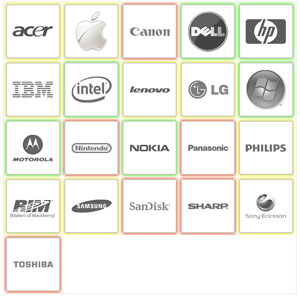Two years ago the Enough Project initiated engagement with major electronics companies on conflict minerals, writing to 21 consumer electronics industry leaders to call their attention to this issue and inquire about the steps they were taking to ensure their products were conflict-free. Their objective was to have companies at the top of the minerals supply chain use their buying power to influence their suppliers, exerting pressure down the supply chain, which has proven to be successful in diamond sector as well. Since then, we have seen a host of efforts initiated by companies, governments, and NGOs, both in Congo and internationally, to trace supply chains back to their sources, independently audit chains-of-custody, and conceptualize certification schemes similar to the Kimberley Process for conflict diamonds.
Enough presents an initial ranking on the progress made by the 21 electronics companies with whom they have engaged in this survey. The report focuses on the efforts within the industry to address the conflict minerals issue and also assesses the response of other industries that are reliant on the conflict minerals. These rankings are an effort to provide consumers with the information they need to purchase responsibly, as well as a means of encouraging companies to continue to move forward in good faith. Check out the report here.
This report provides a clear analysis of the efficacy of advocacy organizations such as Enough. Although they acknowledge there is still much work to be done to end the wars fueled by conflict minerals in the Congo, this report shows the progress so far in their efforts to reach their goals to eradicate the trade of such minerals.


Too often, CSR campaigns have more to do with good PR than ethics. Companies who participate have a stake in assuring their customers that they make responsible choices. I wonder if there is an effective enforcement mechanism that can be used to get companies to comply. The trouble is that enforcement is tricky when companies are operating across borders.
In the end, it will probably come down to consumers demanding ethical practices and the activists who act as watchdogs on their behalf.
After reading this blog, I will definitely pay more attention to the minerals used in my electronics! The egregious violence in the DRC is deplorable and I hope that campaigns, such as Enough or RunForCongo, heighten awareness and dialogue on this issue. While I noted that the box for my Mac computer listed ‘non-conflict minerals,’ I can tell from the Enough campaign that there is still much that Apple and other corporations need to do to effect this change.